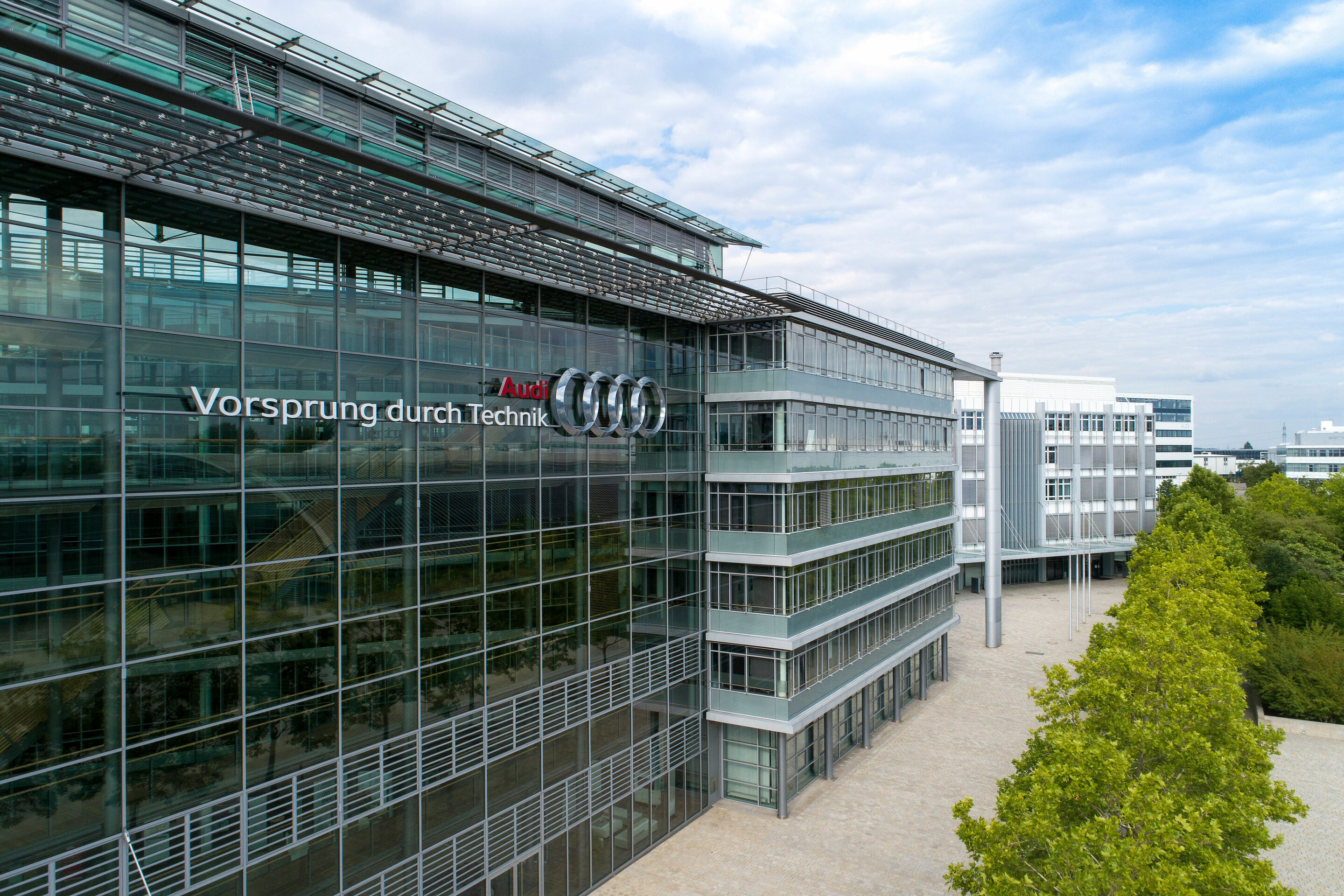Audi Group in first half of 2020: effects of corona pandemic still very significant
- Deliveries to customers: stabilization in the markets
- Continuing along the electrification course: Audi e-tron is world market leader for all-electric vehicles from German premium manufacturers
- Audi Group: €20,476 million revenue, €643 million operating loss before special items, operating return on sales before special items of minus 3.1 percent
- Net cash flow of €1,953 million mainly due to sales of equity interests, investment discipline and inventory reduction
- CFO Arno Antlitz: “We are starting the second half of the year with robust liquidity and are consistently implementing our product roadmap”
- Outlook: Significant recovery expected in the second half of the year, but key financials for 2020 as a whole remain adversely affected by corona
Results of the first six months: In the first half of this year, deliveries, revenue and operating profit were below the previous year’s figures. As expected, the consequences of the corona pandemic are presenting major challenges for the entire economy and for Audi as well. The second quarter in particular featured an orderly restart of production and a significant recovery in customer demand. A positive trend is evident in car deliveries: At minus 22 percent, Audi is significantly better positioned than the market as a whole with minus 28 percent. As a result, the Audi Group’s revenue in the first half of 2020 totaled €20,476 million and its operating loss before special items was €643 million.
“The effects of the corona pandemic are also reflected in our key financial figures. We responded quickly to the corona pandemic and optimized our short-term expenditure without compromising our long-term product plans. We are starting the second half of the year with robust liquidity,” says Arno Antlitz, Member of the Board of Management of AUDI AG for Finance and Legal Affairs. A worldwide decline in demand and interruptions in the supply chain led to global production suspensions and short-time working at Audi’s German plants. All Audi plants have been producing again since end-June.
In the first half of the year, the Audi Group’s revenue fell to €20,476 million as a result of lower unit sales (2019: €28,761 million). The good revenue development of the all-electric Audi e-tron had a positive effect: By the middle of the year, 16,898 Audi e-tron cars had been delivered to customers (2019: 9,444). This makes the Audi e-tron the global market leader among all-electric vehicles from German premium manufacturers. Since May 2020, the Four Rings also gradually launch the Audi e-tron Sportback.
The markets present a mixed picture: In Europe (minus 29 percent) and in the USA (minus 22 percent) the deliveries of the Audi brand were still significantly negative in June. In China, a significant recovery in demand has been apparent since March. The Four Rings achieved record figures there in May and June. Cumulative sales in our most important single market are still slightly down on the prior-year period, by 3 percent. Key growth drivers in China in the first half of the year were the new Audi A6 L, Audi Q2 L and Audi Q5 L.
In the first half of the year, the Audi Group’s revenue fell to €20,476 million as a result of lower unit sales (2019: €28,761 million). The good revenue development of the all-electric Audi e-tron had a positive effect: By the middle of the year, 16,898 Audi e-tron cars had been delivered to customers (2019: 9,444). This makes the Audi e-tron the global market leader among all-electric vehicles from German premium manufacturers. In May 2020, the Four Rings also gradually launched the Audi e-tron Sportback.
Against the backdrop of the difficult market situation caused by the pandemic, the operating loss was €750 million (2019: operating profit of €2,300 million) and the operating return on sales was minus 3.7 percent (2019: plus 8.0 percent). Extensive measures on the cost side only partially offset the declining volume. The remeasurement of hedging transactions also had a negative impact on the development of earnings. Adjusted for special items of €108 million in connection with the diesel issue, the operating loss amounted to €643 million (2019: operating profit of €2,300 million). The adjusted operating return on sales was minus 3.1 percent (2019: plus 8.0 percent). The sale of Autonomous Intelligent Driving GmbH within the Volkswagen Group had a positive effect on operating profit.
For the reporting period, the Audi Group’s profit before taxes amounted to €86 million (2019: €2,580 million). This includes financial income of €836 million (2019: €280 million). A major reason for the increase is the higher income from investments as a result of the intra-Group sale of Audi Electronics Venture GmbH.
Despite a difficult market environment, the Audi Group’s net cash flow and net liquidity remained strong: The net cash flow amounted to €1,953 million, especially against the background of the sales of a company (2019: €2,253 million). Net liquidity remains at the high level of €19,875 million (end of December 2019: €21,754 million). In the context of the corona pandemic, Audi has set up a liquidity task force to systematically reduce cash outflows and help to secure Audi’s long-term ability to act. All non-product-related costs and investments are systematically scrutinized. Thanks to its strengthened investment discipline, the Audi Group has achieved a ratio of capital expenditure to revenue of 2.4 percent (2019: 3.0 percent).
“Despite initial positive signals from the markets, the year 2020 remains extremely challenging. We are steering through the Corona crisis in a highly concentrated manner and with the necessary flexibility. Although we have thoroughly reviewed our short-term expenditure in recent weeks, we are keeping a close eye on our long-term projects and are implementing them consistently,” says Arno Antlitz. “Our strategic decisions define the agenda for the coming years. At the heart of this is the electrification and digitalization of our model range.” One example is Artemis. This new unit will accelerate the development of additional electric models. In addition, Markus Duesmann, Chairman of the Board of Management of AUDI AG, is taking charge of software in the Volkswagen Group Board of Management as part of his responsibility for research and development, and will therefore manage the new Car.Software-Organization unit within the Volkswagen Group.
For the year 2020 as a whole, the company assumes that demand in global car markets will be significantly lower against the backdrop of the ongoing corona pandemic. The Audi Group therefore expects deliveries of the Audi brand and revenue to be significantly lower than in 2019. The result of operations is also expected to be substantially down on the previous year, but clearly positive. Net cash flow is expected to be below the prior-year level.
Download Audi’s Half Year Financial Report:
http://www.audi.com/halbjahresfinanzbericht2020
Selected key figures for the Audi Group
| 1st half 2020 | 1st half 2019 | |
| Car deliveries Audi brand | 707,225 | 906,180 |
| Revenue Audi Group in EUR million | 20,476 | 28,761 |
| Operating loss/profit Audi Group in EUR million | –750 | 2,300 |
| Operating return on sales Audi Groupin percent | –3.7 | 8.0 |
| Operating loss/profit before special items | –643 | 2,300 |
| Operating return on sales before special items | –3.1 | 8.0 |
| Net cash flow Audi Group in EUR million | 1,953 | 2,253 |
Audi brand deliveries to customers
| Q2 2020 | Q2 2019 | Difference year on year | |
| World | 707,225 | 906,180 | –21.9 % |
| Europe | 265,047 | 419,460 | –36.8 % |
| - Germany | 98,381 | 152,431 | –35.5 % |
| - UK | 40,399 | 81,196 | –50.2 % |
| - France | 18,539 | 30,141 | –38.5 % |
| - Italy | 21,541 | 34,944 | –38.4 % |
| - Spain | 16,726 | 28,842 | –42.0 % |
| USA | 76,210 | 101,440 | –24.9 % |
| Mexico | 3,703 | 5,966 | –37.9 % |
| Brazil | 2,585 | 3,532 | –26.8 % |
| Mainland China and Hong Kong | 302,512 | 312,502 | –3.2 % |

